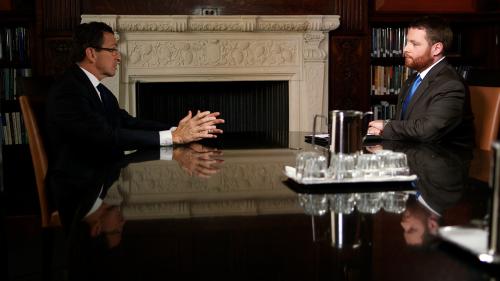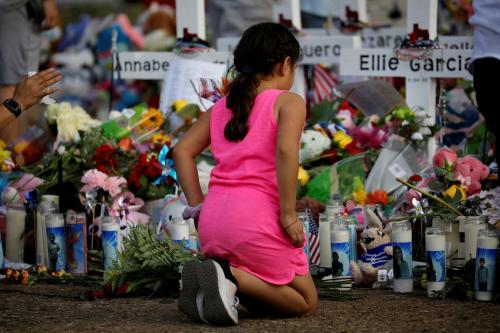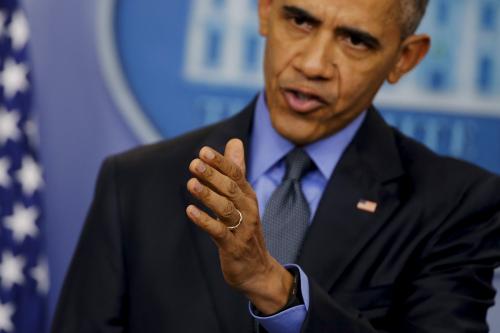Six years ago today, a young man with mental illness, hate in his heart, and access to a cache of weapons shot his way into Sandy Hook Elementary School in Newtown, Connecticut and classrooms occupied by six-year-olds and school staffers. The tragedy that struck that town, my home state, and our nation was unspeakable. It motivated urgent calls for gun reform, reform to our mental health system, and school safety. Since that cold December day, there have been at least 1,917 mass shootings in the United States, claiming the lives of 2,175 individuals.
In the wake of that shooting I penned what remains the most difficult piece of writing in my time at Brookings, and in follow-up pieces, wrote about the politics of gun control policy at the national level. While states like Connecticut, Massachusetts, New York, and others made changes to their policies around guns, mental health care, and school safety, nothing changed at the national level. Since then we have seen larger massacres (in terms of casualties) in Orlando and Las Vegas, while Congress has remained silent.
So, the question remains, has anything changed since Sandy Hook and what does the future of this issue look like?
The Sandy Hook shooting motivated a groundswell of grassroots movements to address the issue of gun violence and gun safety, elevate and coordinate the conversation, and establish a counterweight to the tremendous political and policy influence of the National Rifle Association. Numerous groups have popped up, but chief among them is Everytown for Gun Safety, chaired by former New York City Mayor Mike Bloomberg. Everytown emerged in 2014 from a coalition between Mayors Against Illegal Guns (Bloomberg’s previous organization formed in the mid-2000s) and Moms Demand Action for Gun Sense (an organization formed the day after the Sandy Hook Massacre by Shannon Watts).
Since then, the organization has grown in size, strength, and financing. It has engaged in significant political activity, including working with the survivors-turned-activists in the wake of the February 2018 Marjorie Stoneman Douglas High School shooting in Parkland, Florida. During the 2018 midterms, according to the Washington Post, Everytown endorsed 196 candidates (of whom 150 won) and spent over $30 million on campaigns. The same Washington Post piece notes that this activity from Everytown comes in the wake of donations to the NRA dropping dramatically in 2018; it also occurs as the NRA is implicated in a growing international political scandal involving the Russian Federation.
That is not to say Everytown is winning the war. If it were, the powerful grip the NRA has on Congressional Republicans—and even several Democrats—would have weakened, allowing a window to open for gun reform. That certainly has not happened, and the NRA remains, despite recent news, one of the most powerful political forces inside the Beltway.
However, Everytown continues to build strength. In a horrific way, because mass shootings keep happening in the United States, there is an unfortunate and steady stream of news that motivates people to care about gun safety and keep it in focus. As Everytown builds momentum and continues lobbying efforts at the federal, state, and local levels, additional opportunities for changes to policies or to conversations will arise. And the success of House Democrats in regaining control of the majority could highlight that momentum.
The Democratic Caucus in the House cares deeply about the issue of gun safety, with many incumbent and incoming-freshman members running on the issue in the 2018 midterms. Leadership has spoken of the importance of the issue, and many of the soon-to-be-declared 2020 presidential candidates like Cory Booker, Elizabeth Warren, Joe Biden, and others have spoken passionately about the topic. If House Democrats are serious about the issue, you will start to see additional hearings on gun safety legislation and likely floor votes on the issue as well.
Incoming Speaker Nancy Pelosi has no belief that gun safety legislation that passes the House has a chance of even being considered seriously in the Senate. Her power on this topic is not to change the law, but to change the conversation. House-passed gun safety legislation will motivate media organizations to ask senators and the president to go on record with their position—not just on the issue broadly but a piece of legislation specifically. Activity in the House can set the agenda for Democratic presidential primary debates and stump speeches, which will elevate the conversation even further.
Gun safety will likely be an important issue in the 116th Congress and the 2020 presidential primary race. Supporters of the issue—those most vocal about gun reform—can thank Shannon Watts, Michael Bloomberg, Nancy Pelosi, other elected officials, and the thousands of grassroots activists who have refused to allow the lives lost to gun violence to be in vain and refused to ignore this issue, as the United States Congress has for too long.
The Brookings Institution is committed to quality, independence, and impact.
We are supported by a diverse array of funders. In line with our values and policies, each Brookings publication represents the sole views of its author(s).











Commentary
Six years after Sandy Hook, House Democrats can build on grassroots gun reform
December 14, 2018